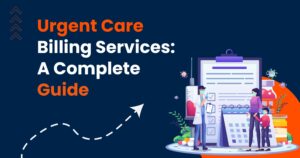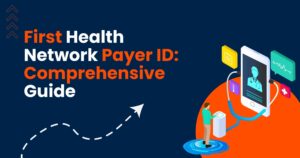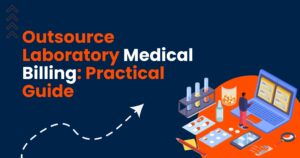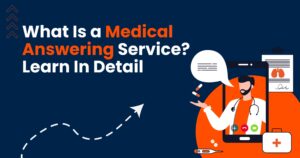Healthcare data is profoundly digitized, and like various other industries, Medicare data is growing in volume, velocity, and value. Does it intrigue you to know more about this lifeblood that keeps the healthcare system running smoothly? Continue reading to understand data management in healthcare as a practice to collect, store, and analyze data from multiple healthcare sources.
Managing this vast trove of information requires time-tested strategies for better quality, security and accessibility. By focusing on the key aspect of healthcare data management, medical organizations can easily maintain regulatory compliance, drive valuable insights, and deliver better care. In a race to say goodbye to legacy systems, this insightful guide pours valuable details about essential components. This includes administrative data management practices, and security measures for effective healthcare operations. Let’s dive into the handy information that truly makes a difference.
Importance of Data Management in Healthcare | An Overview
Before the audience jumpstarts to read the sleek important features of HDM, let’s know about the term in an unbroken line of descent. Healthcare data management is a ‘’housekeeper’’ in an electronic health record (EHR/EMR). Health informatics is the heart of the patient data management system. From accuracy, accessibility, timelessness, consistency, and improved operational efficiency to better decision-making, data is being efficiently processed and logically organized in HDM. The old saying, ‘’You can’t manage ever, what you don’t measure’’ resonates well with the crux of the topic.
Forbes 2023 Report reflects tremendous investment growth in healthcare data storage from $4.88 billion in 2022 to $5.7 billion in 2023. The projection mirrors the growth up to $10 billion by 2027.
Below is an overview of health data:
- Healthcare notes
- Lab test results
- Procedures and surgeries
- Patient demographics
- Medical prescriptions
- Medical images like X-rays, computerized tomography (CT), and MRI
- Health prescriptions
- Health provider information
Let’s buckle up to know the significance of data management.
- Time is a limiting factor; up-to-date and validated patient medical records are important for the quality of health data.
- Effective compilation of medical data, integration and analysis to derive meaningful insights with secure patient data management.
- Timely access and accurate patient health information provide a way forward to quick diagnosis, reducing the margin for medical errors.
- HDM slashes redundancies, elevates productivity, and streamlines operations.
- Shows compliance with HIPAA regulations to control sensitive patient data breaches.
- Clinical decision support systems (CDSS) serve as one of the mediums to interpret healthcare data for customized treatment plans.
- With AI enhancing healthcare data usage, it is easy to predict outcomes that the naked eye could have missed.
What are the Essential Components of Healthcare Data Management?
Statista Insights projects a spike in the digital health market up to US$197.90 billion in 2025 and US$258.30 billion by 2029. The careful stewardship of data gathered from different sources defines one of the aspects of the healthcare data management process. Some key sources are:- Patient medical history
- Clinical records
- Electronic health records
- Administrative data
- Patient feedback
Data Quality Control
Quality control associated with patient data refers to the timely control of detrimental information that may lead to bad diagnoses or medical treatment plans. It involves multi-steps from detecting to correcting errors, inconsistencies and inaccuracies in the data.Data Governance
It is about data standardization in terms of information collection methods, quality and consistency maintenance throughout the healthcare system. The role of data governance penetrates up to defining members who can take what action, what type of data, under what circumstances, and using what strategies.Digital Security Measures
Digital rise accentuated the risk of cybersecurity risks. Shifting healthcare data management systems to cloud-based platforms is a way forward to the proactive security of sensitive information. This process involves robust use of safe remote patient data adhering to strict regulations to control unauthorized access to the patient information.Clinical Decision Making
Having quality data, healthcare organizations better leverage predictive analytics to make sound decisions. Whether it is about choosing the right business intelligence initiatives for appropriate treatment methods or resource allocation, data-driven insights lead to improved health results and patient care. Maintaining the vast trove of medical data generated, its quality, security compliance and effective usage sound like a herculean task. With the effective incorporation of artificial intelligence in robust solutions, healthcare organizations can manage the data successfully and efficiently.Top Benefits of Health Data Management
According to Global Market Insights, healthcare analytics market size is forecasted to hit USD 55.6 billion by 2032. The quality of data you have, the better the decisions you can make and achieve the anticipated healthcare outcomes. This section provides the privilege to explore the benefits of health data management from an elementary perspective. The benefits of health data management are revolutionizing healthcare delivery and operational activities.
Better Communication
Communication improves patients’, health providers, and other stakeholders’ access to digital records. A comprehensive view of patient health information allows doctors to better collaborate with patients. It is also productive across geographic boundaries.
Improved Patient Engagement
Better health data management enables patients to view their health records themselves. It helps them to look into their treatment and care plans for expected outcomes. They can seamlessly reach their health information anytime and collaborate with their respective consultants.
Health Data Analytics
It provides the privilege to make accurate predictions about patients’ health to ensure effective treatment. A proactive approach to providing care and personalized health solutions is the byproduct of careful data analytics.
Data-driven Decisions
Data is power and effective health data management leaves a panoramic effect under the shade of historical data, real-time information, and other types of data. It allows health providers to engage with the patients in the critical decision-making process. Instead of inaccurate guesses based on hunches, HDM also improves diagnostic abilities.
Integration with Latest Technologies
This rapid shift of the healthcare industry to artificial intelligence and other emerging technologies improves the diagnostic capabilities of doctors. Medical chatbots further glorify this concept and efficiently leverage medical data management systems for better self-service.
Integration with Patient Health-Related Activities
It supports integration of patients with sensors for active monitoring of their activities. It also improves health data management for effective treatment plans. Different mobile applications assist patients in integrating their devices with healthcare data management systems from sensors.
What are the Challenges in HDM?
HDM is more than just a buzzword; it serves as a fundamental pillar supporting modern healthcare systems. It has a unique set of multiple challenges. Healthcare organizations must understand these challenges to address them successfully.Data Volume
The vast amount of daily data generated including medical records and real-time health monitoring via devices complicates the management of this unstructured data.Data Security Threats
With the prevalent cybersecurity attacks, protecting vulnerable healthcare information has become a bottleneck challenge. Uncontrolled access to electronic health records and other susceptible data can lead to negative consequences.Data Quality Maintenance
Compromise on the quality of data or incomplete information can be devastating for patient treatment. It may further lead to misinformed decisions and other inefficiencies. Ensuring accuracy and consistency on multiple touchpoints is a great hurdle.Evolving Regulatory Protocols
Adhering to and keeping up with changing compliance requirements like GDPR and other legal obligations can be crucial. It is especially an obstacle for health organizations with limited resources and expertise.Data Integration Across Platforms
Most healthcare organizations normally struggle with fragmented systems. Without proper data integration, medical records, administrative information and patient engagement remain inefficient.Emerging Trends in Healthcare Data Management
Digital transformation lies at the core of the modern healthcare sector. As the healthcare industry finds new solutions to big data storage challenges and other cybersecurity pitfalls, there are various advanced technologies ready to consolidate data management systems and improve patient feedback.
- Cloud-based solutions for higher scalability and smooth healthcare data management. These platforms simplify data access at a low cost.
- Blockchain technology works as a decentralized method for tamper-proof data storage, effective data integrity and sensitive data management.
- Predictive analytics leverages real-time data to analyze and anticipate patient needs. It also helps to optimize resources and medical decisions.
- Health informatics helps medical providers to integrate real-time data from a variety of sources for higher operational efficiency.
Are you prepared to revolutionize your healthcare data management system? By leveraging cutting-edge technologies and tailored solutions from IT experts, addressing the challenges and unlocking actionable insights is a breeze for healthcare organizations. Let’s get the ball rolling to achieve an innovative future for healthcare.





